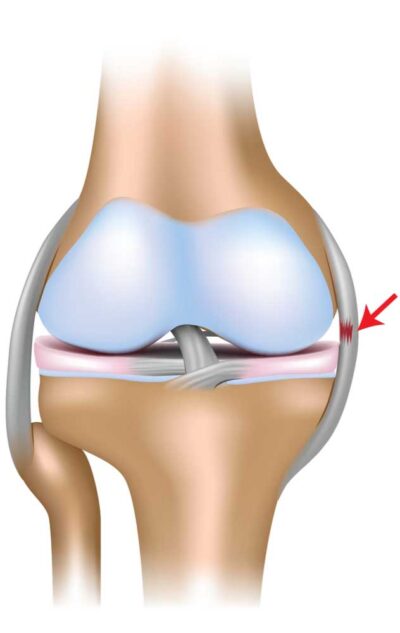What and where is the MCL?
The Medial Collateral Ligament (MCL) in the knee does not get talked about as much as the ACL, although it is one of the most commonly injured ligaments in the knee. The MCL is located on inner aspect of the knee but is technically outside of the knee joint (extra-articular). It extends from the end of the femur (thigh bone) to the top of the tibia (shin bone). The MCL is part of the mechanism that allows the knee to rotate while keeping it stable. Its primary job is to prevent the leg from over-extending inward. An injury to the MCL occurs when extreme force is placed on the outer side of the knee, causing the ligament on the inside to stretch or tear. MCL injuries are most often seen in athletes who participate in contact sports. Individuals in Vail, Aspen and the surrounding Denver, Colorado communities who have experienced an MCL injury rely on Dr. Armando Vidal, orthopedic knee specialist to successfully treat their MCL injury or tear. Dr. Vidal has extensive success in helping patients recover from an MCL injury.

How does the MCL become injured?
Contact sports are often the main culprit of an MCL injury including football, soccer, basketball, hockey, or any condition where a force could be applied to the outside of the knee. Most often, the MCL injury occurs in relation to a sporting or car accident. However, MCL injuries can occur without outside contact to the knee. They can happen if the outside of the knee is stressed far enough to stretch or tear the medial knee structures. This can happen with a bad landing from a jump, falling off a bike, or a quick change in direction while running that would twist the knee.
Are there different grades or types of an MCL injury?
Similar to other ligament injuries, the MCL is classified based on the amount of tearing present:
- Grade 1: The ligament is stretched but not torn. This is the least severe.
- Grade 2: The MCL has been partially torn and is causing instability in the knee.
- Grade 3: The most severe type of tear, where the MCL is torn completely and the joint is very unstable.
What are the symptoms of an injured medial collateral ligament?
Symptoms of an injured MCL are similar to other knee ligament injuries and should be evaluated by Dr. Vidal. Patients who experience an MCL injury often report:
- Tenderness and pain on the inner side of the knee.
- A popping sound when the injury occurs
- Swelling of the joint (not as severe as ACL injury)
- Bruising on the inner (medial) aspect of the knee – typically 3-4 days later
- Limited range of motion
- Knee instability – the feeling of it collapsing or “giving way”
- Locking or catching in the joint
Which is worse, and MCL tear or an ACL tear?
The medial and anterior cruciate ligaments perform similar jobs in keeping the knee joint stable and symptoms of injury are also similar. Both MCL and ACL tears have the following in common:
| Symptom | MCL | ACL |
|---|---|---|
| Popping Sound at time of injury | X | X louder, more distinct pop |
| Swelling | X inner side of knee |
X diffuse and more pronounced |
| Pain and/or tenderness | X inner side of knee |
X lateral side of knee |
| Knee feels unstable or gives way | X | X |
| Unable to put weight on the leg or knee | X |
How is an MCL injury diagnosed?
Most MCL injuries can be diagnosed with a thorough physical exam. The best imaging test for an MCL injury is an MRI scan. This will also evaluate the other ligaments, tendon and knee cartilage.
How is a torn MCL treated?
Thankfully, the vast majority of MCL injuries can be treated non-operatively. Grade 1 and 2 MCL injuries are universally treated non-surgically with reliable healing. These are sprains, or partial tears and are best treated with rest, bracing, ice and anti-inflammatory medication.
Even the vast majority of Grade 3 MCL injuries can be treated non-surgically. The MCL has a robust ability to heal itself – even in the setting of a concomitant ACL injury. Some MCL injuries, though, can be troublesome and have a lower propensity to heal. These are typically tibial sided injuries, some very high-grade mid-substance injuries, and chronic injuries with persistent instability.
Depending on the context, these injuries can be treated with repair and/or reconstruction. Since operative management of these injuries is rare, it is important for patients in the greater Denver and mountain region to seek out a surgeon like Dr. Vidal and his colleges at the Steadman Clinic who specialize in MCL and other knee injuries for the best possible outcome. This does not only include experience with the technical aspects of the repair/reconstruction itself but the decision making on which injuries require intervention at all.
What is the prognosis for an MCL injury?
Generally, the prognosis for an MCL injury is very favorable. A large number of MCL injuries are able to heal on their own, without surgical intervention and the outcome is generally good. For those who require surgery, the recovery time is typically 5-6 weeks if no other ligaments needed repair. A hinged brace is often recommended when patients return to sporting activities. This will help keep the knee stable and avoid further injury.
MCL Reconstruction Specialist
Are you an athlete participating in a contact sport? If so, you may be at risk of experiencing a severe MCL injury. These injuries typically occur due to a large force colliding with the outside of the knee, causing damage to the MCL. Complex knee specialist, Doctor Armando Vidal has assessed and treated many patients in Vail, Aspen, and the surrounding Denver, Colorado communities who have experienced damage to the MCL. Contact Dr. Vidal’s team today!

Locations
180 S Frontage Rd W
Vail, CO 81657
226 Lusher Court
Ste 101
Frisco, CO 80443
322 Beard Creek Road
Edwards, CO 81632


